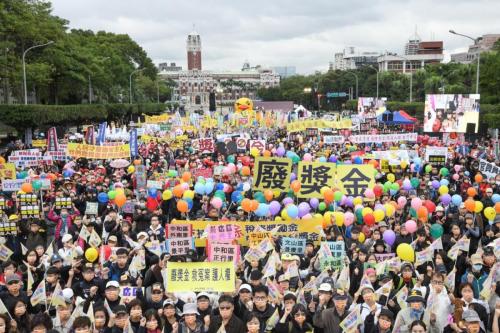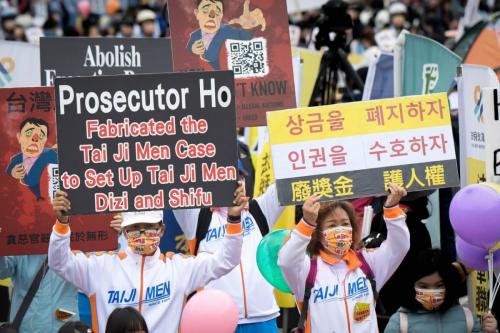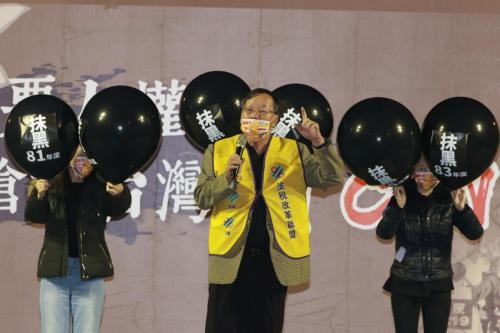To Save Taiwan and Change the Future by Abolishing the Bonus System
As we look forward to 2021, a civic movement on Ketagalan Boulevard at the end of 2020 unveiled a democratic crisis. 2020 was a year plagued with tax disasters, illegal seizure of private properties, excessive police enforcement, and suppression of free speech etc., which are all manifestations of democratic backsliding. The Legal and Tax Reform League and Action Alliance to Redress 1219 co-hosted a protest to “March for Anti-violence and Human Rights to Change the Future” with nearly ten thousand participants belonging to more than 50 non-governmental organizations as well as elected representatives from all over Taiwan gathering on Ketagalan Boulevard to demand the protection of human rights, rectification of cases of injustice and abolition of bonuses. The event lasted from the afternoon to late hours of the night and was featured in over 100 reports by local and international media and live broadcasts by 12 YouTubers.

The 1219 initiative presented three demands for reform:
1. Protection of human rights. Identify and punish the officials behind these cases of human rights violations.
2. Rectification of unjust cases. Rescind illegal tax bills and enforcement and return forcibly seized private properties to the victims.
3. Abolishment of bonuses. Abolish bonuses for tax collection and enforcement, which incentivize tax officials to issue illegal tax bills. Many victims, scholars and experts in tax laws and elected representatives all spoke out in the cold, wet weather to appeal to the Tsai administration.

Professor Chen Tze-lung, the founder of the Legal and Tax Reform League, pointed out that Taiwan’s democracy is marred by deep authoritarian legacies, which promote the notion that the government is the boss and the people depend on it. That's why the government is bullying the people and creating bonuses by illegal budgeting, and still considers the bonuses legal, said Prof. Chen. A small number of corrupt officials, incited by bonuses, would fabricate cases that caused great pain to the victims. The people are the masters in their own right and they demand reform. The Legislative Yuan, Executive Yuan, Judicial Yuan, media, and all professions should adopt a human rights-based approach when performing their duties to meet these obligations: to respect, protect and guarantee human rights, said Prof. Chen, adding that only then will there be hope in Taiwan’s future.

Chung Chun-lan, the widow of Chien Yong-song, a tax victim, said that the National Taxation Bureau (NTB) never gave the taxpayers a chance to explain their case, which was against the Tax Collection Act. Instead, the NTB issued a tax bill to them concerning their dissolved business in the amount of NT$4 million (about USD$141,500). The bill was paid reluctantly based on their accountant’s suggestion that it was better not to fight the NTB. Thereafter, another tax bill of NT$70 million (about USD$2,475,700) was issued. In order to apply for an administrative appeal, they paid more than NT$30 million (about USD$1,061,000) upfront; however, the judge in the administrative court favored the NTB and even dozed off during the court sessions, reported Chung. The statute of limitations for tax assessment is 5 years, yet they were asked to pay the taxes 11 years after the dissolution of their company, said Chung, adding that her husband was the first convener of Amnesty International in Taiwan. If a human rights activist was helpless against tax persecution, where would ordinary people find help?
Mrs. Chung, a tax victim, said that her husband’s company filed for dissolution but, due to an oversight, didn’t do the liquidation, and the NTB issued an unjustified tax bill of more than NT$50 million (about USD1,768,000) and imposed a travel ban on her husband. In 2019, the Ministry of Finance notified the Enforcement Agency to lift the travel restrictions, but the Enforcement Agency denied the request! Mr. Chung, who was abroad, was separated from his wife, children and parents in Taiwan for seven years.
In 2020, human rights violations in Taiwan shocked the international community. In August, the land of Tai Ji Men’s leader was auctioned and confiscated although no tax was owed. In September, the 919 ZhubeiIncident happened, which severely violated the people's freedom of speech. Ms. Huang, a volunteer for tax reform, was illegally arrested while showing her support for the Tai Ji Men case. She was then interrogated late into the night and was imposed residence restrictions. We couldn’t help asking, "Does the government intend to fix the people’s problems? Or does it only want to punish the people who ‘point out the problems’"?
Ms. Huang attended the rally with her husband and children. Her husband said that the arbitrary accusations by the police rendered them defenseless. It has been three months since the event occurred, but the prosecutor has taken the strategy of inaction which psychologically torments the entire family. If the people do not unite, someone else might suffer the same fate in the future.
The Tai Ji Men case is emblematic of the human rights situation in Taiwan. Mr. Lee, the dizi representative of the Tai Ji Men case said, “The case is 24 years old and will soon enter its 25th year. In the course of the case’s legal proceedings, we were able to ‘inspect’ Taiwan’s legal and taxation system, relief system, and administrative litigation. The violence and violations of law by administrative and taxation agencies, the unlawful judgments by the administrative courts, and illegal auctions of the land by the Administrative Enforcement Agency are just some observations of a government that is evidently sick. Today, we stand up with the hope of reforming the legal and tax systems, eliminating all state violence, and making real progress in human rights in Taiwan.”
Gao Ding-yi, a human rights observer of the Association of World Citizens, an NGO in consultative status with the UN, pointed out that the Supreme Court ruled that Tai Ji Men was not guilty of tax evasion or any other charges. and Tai Ji Men did not owe any tax, but the Administrative Enforcement Agency jumped the gun and auctioned the land before completing the established legal procedure. The process involved many violations of law, such as lack of transparency, failure to send the notice to the party concerned, and auction of property whose value was much higher than the tax amount. From the Chen Ching-Hsu case, Ms. Huang’s case, to the Tai Ji Men case, the Administrative Enforcement Agency employed their usual tactics like discrediting the people, leaking personal information, creating a chilling effect, and creating disputes.
Wu Ching Chin, an associate professor of law at Aletheia University, asserted that even before the land belonging to Tai Ji Men’s leader was auctioned, the Administrative Enforcement Agency was already engaged in discussion on how to apportion the bounty. The auction failed, and the state confiscated these properties, and the government officials collected the bonuses, which were derived from tax dollars.
Lawyer Sean Chen, director of Chengquan International Law Firm, said that he could not comprehend the groundless accusations made against Tai Ji Men. Twenty-four years is too long. This should not happen in a democratic country, said Chen, adding, "Unjust cases should be redressed. It is just a matter of commitment on the part of the government."
According to Wei Si-Tsong, an assistant professor in the Department of Business Administration of Fu Jen Catholic University, in the Tai Ji Men case, officials violated 169 articles of 34 laws, but no officials were punished. He calls on the Legislative Yuan to amend the law as soon as possible and formulate penalties for civil servants who abuse their power and violate the law while performing their jobs.
Lin Jun Lin, chairman of the Chinese Orthodox Alliance, said that Tai Ji Men has used reasonable and rational ways to fight for its rights for 24 years. This is a noble democratic quality. How could the government turn away the people's demands?
It is because of the unjust legal and tax systems and the existence of the bonus system.
Tsai Weijie, president of the New Taipei City New Generation Rotary Club, called on the government to vindicate the Tai Ji Men case. The prevalent public view is that the bonus system should be abolished as it is suspected that the NTB officials forced the auction of Tai Ji Men’s land to fatten their own pockets, in addition to better their performance review, and chance of a promotion. "The state took over Tai Ji Men’s land but did not receive a dime. However, the officials of the National Taxation Bureau and the Enforcement Agency received bonuses. Is this reasonable?"
A video featuring the highlights of the third Ministerial to Advance Freedom of Religion or Belief in 2020 was presented during the rally. During one of the side events, scholars and experts discussed the case of Tai Ji Men in Taiwan and pointed out that using taxation as a tool to discriminate against a spiritual organization violates international human rights law.
President of the European Federation for Freedom of Belief, Mr. Alessandro Amicarelli said that according to the legal principle of estoppel, “it should not be argued or asserted that Tai Ji Men have to pay taxes for the disputed year 1992, as there should be no dispute at all, being this a clear contradiction.” Professor Kenneth Jacobsen from Temple University Law school pointed out, “The government of Taiwan should do the right thing and eliminate the tax for 1992, which is just absurd, considering what has happened for 1991 and the other years, and restore the property that was unlawfully seized.”
Founder of International Human Rights Without Borders Organization Mr. Willy Fautré said that a lot of time and money had been spent in the Tai Ji Men case and it caused irreparable damage to Tai Ji Men’s reputation. The editor-in-chief of Bitter Winter Magazine, Mr. Marco Respinti, believes that everyone should support Tai Ji Men in their fight for freedom, justice and human rights. Dr. Massimo Introvigne, the founder of the Center for Studies on New Religions, pointed out that the Tai Ji Men case will become an important international precedent, and a white paper will be published to call on the international community to pay attention to this case.
(video source https://youtu.be/DKUTFLrtPiM)
There were supporters from over 20 countries, holding up slogans in various languages to express their support. In addition, live broadcasts from countries around the world helped bring their voices to the Tsai administration!
Source: Global People Daily News
- 867 reads
Human Rights
Fostering a More Humane World: The 28th Eurasian Economic Summi

Conscience, Hope, and Action: Keys to Global Peace and Sustainability

Ringing FOWPAL’s Peace Bell for the World:Nobel Peace Prize Laureates’ Visions and Actions

Protecting the World’s Cultural Diversity for a Sustainable Future

Puppet Show I International Friendship Day 2020

